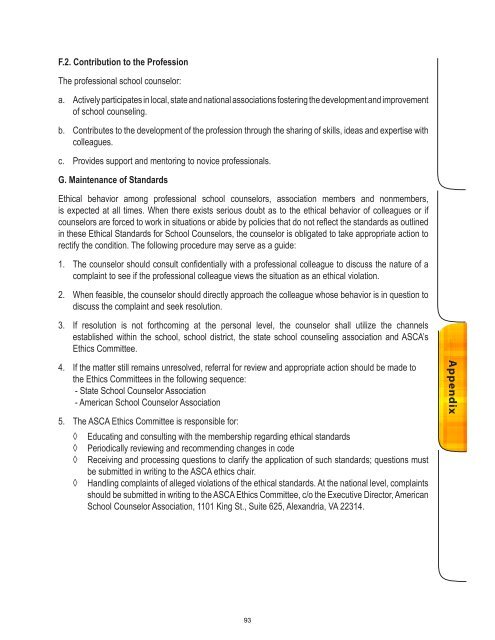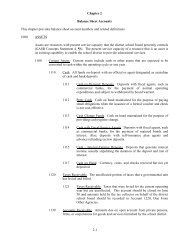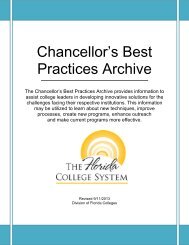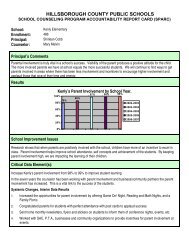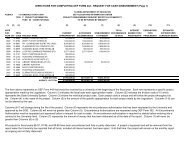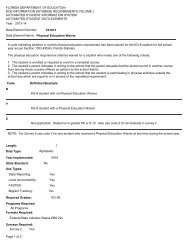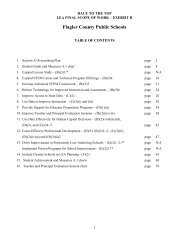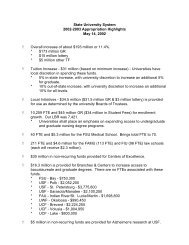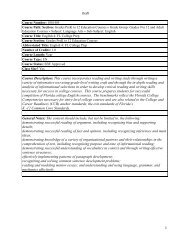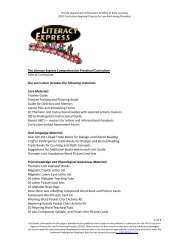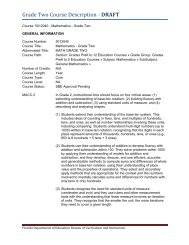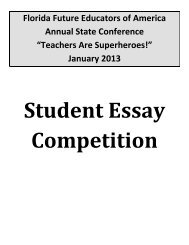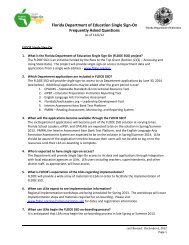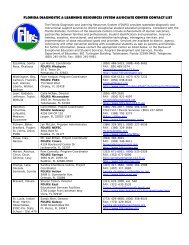Florida's School Counseling Framework - Florida Department of ...
Florida's School Counseling Framework - Florida Department of ...
Florida's School Counseling Framework - Florida Department of ...
Create successful ePaper yourself
Turn your PDF publications into a flip-book with our unique Google optimized e-Paper software.
F.2. Contribution to the Pr<strong>of</strong>ession<br />
The pr<strong>of</strong>essional school counselor:<br />
a.<br />
b.<br />
c.<br />
Actively participates in local, state and national associations fostering the development and improvement<br />
<strong>of</strong> school counseling.<br />
Contributes to the development <strong>of</strong> the pr<strong>of</strong>ession through the sharing <strong>of</strong> skills, ideas and expertise with<br />
colleagues.<br />
Provides support and mentoring to novice pr<strong>of</strong>essionals.<br />
G. Maintenance <strong>of</strong> Standards<br />
Ethical behavior among pr<strong>of</strong>essional school counselors, association members and nonmembers,<br />
is expected at all times. When there exists serious doubt as to the ethical behavior <strong>of</strong> colleagues or if<br />
counselors are forced to work in situations or abide by policies that do not reflect the standards as outlined<br />
in these Ethical Standards for <strong>School</strong> Counselors, the counselor is obligated to take appropriate action to<br />
rectify the condition. The following procedure may serve as a guide:<br />
1.<br />
2.<br />
3.<br />
4.<br />
5.<br />
The counselor should consult confidentially with a pr<strong>of</strong>essional colleague to discuss the nature <strong>of</strong> a<br />
complaint to see if the pr<strong>of</strong>essional colleague views the situation as an ethical violation.<br />
When feasible, the counselor should directly approach the colleague whose behavior is in question to<br />
discuss the complaint and seek resolution.<br />
If resolution is not forthcoming at the personal level, the counselor shall utilize the channels<br />
established within the school, school district, the state school counseling association and ASCA’s<br />
Ethics Committee.<br />
If the matter still remains unresolved, referral for review and appropriate action should be made to<br />
the Ethics Committees in the following sequence:<br />
- State <strong>School</strong> Counselor Association<br />
- American <strong>School</strong> Counselor Association<br />
The ASCA Ethics Committee is responsible for:<br />
◊ Educating and consulting with the membership regarding ethical standards<br />
◊ Periodically reviewing and recommending changes in code<br />
◊ Receiving and processing questions to clarify the application <strong>of</strong> such standards; questions must<br />
be submitted in writing to the ASCA ethics chair.<br />
◊ Handling complaints <strong>of</strong> alleged violations <strong>of</strong> the ethical standards. At the national level, complaints<br />
should be submitted in writing to the ASCA Ethics Committee, c/o the Executive Director, American<br />
<strong>School</strong> Counselor Association, 1101 King St., Suite 625, Alexandria, VA 22314.<br />
93<br />
Appendix


